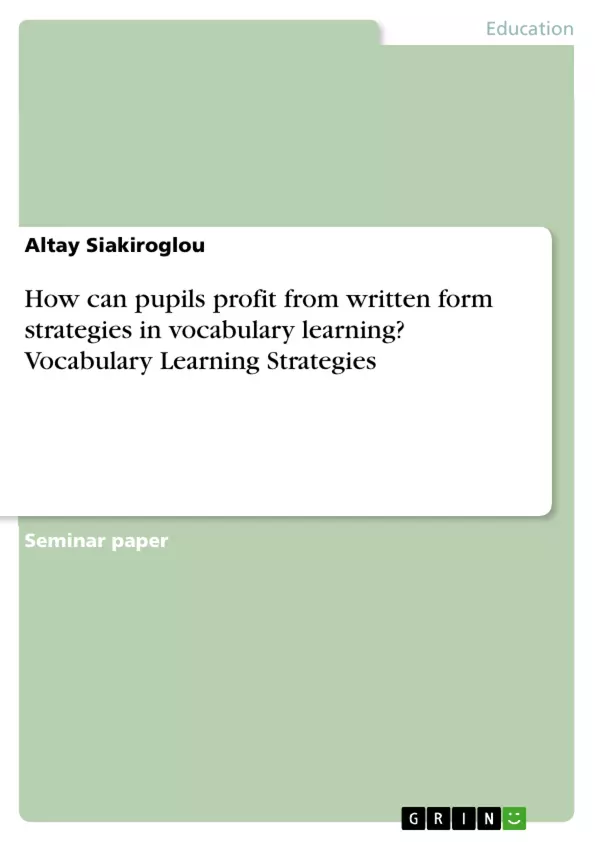Several studies have been done over the years to prove or fortify the influence and significance of learning strategies on language learning processes. It is generally agreed today that language strategies have an enhancing influence on the whole spectrum of the language learning process. However, even being aware of this fact language learning strategies particularly for vocabulary learning have been for some reason neglected for many years. That is difficult to understand considering the importance of vocabulary or word knowledge and therefore prerequisite for any further language learning processes. Simultaneously it means that any language process can not take place without vocabulary. Such an important field of a language being just learned through strict memorization has raised questions especially based on retention as pupils could not retain the learned vocabularies over a longer period. Nevertheless, researchers recently have realized the gap in the language learning strategies and have started to explore the field of vocabulary strategies and their influence on vocabulary acquisition. Researchers have found out different strategies covering different fields like spoken form language strategies or written form language strategies and so on in the course of learner-oriented teaching.
Against this background, the central question that motivates this paper is: How pupils can profit from written form strategies in vocabulary learning? To answer this question, we begin by taking a closer look at vocabulary learning strategies which are divided in indirect and direct strategies. Given that I will focus on written form vocabulary I will solely focus on direct strategies which are again divided in different substrategies. Afterwards, I will investigate a few methods and research their influence on the vocabulary acquisition and their facilitating factors. Furthermore, I will explore the aspect of learner autonomy to explore the impact of independent learning. Subsequently, I will look at the renewed task of the teachers in terms of vocabulary teaching and the importance of the mental lexicon on vocabulary retention. Finally, I will sum up my results and identify an outlook on further researches. Diverse resources – secondary literature and online publication – were used for the investigation of the question that underlies the paper to show a wide-ranging overview.
Inhaltsverzeichnis (Table of Contents)
- Introduction
- Vocabulary learning strategies
- Direct strategies
- Cognitive Strategies
- Flash card
- Keyword
- Memory Strategies
- Grouping
- Semantic Mapping
- Cognitive Strategies
- Learner autonomy
- Role of the Teacher
- The Mental Lexicon
- Conclusion
Zielsetzung und Themenschwerpunkte (Objectives and Key Themes)
This paper investigates the effectiveness of written form strategies in vocabulary learning for pupils. It explores the role of direct strategies, specifically cognitive and memory strategies, in enhancing vocabulary acquisition and retention. The study delves into various methods and techniques associated with these strategies, focusing on the potential of flashcard and keyword techniques.
- Impact of written form strategies on vocabulary learning
- Effectiveness of direct strategies (cognitive and memory) in vocabulary acquisition
- Influence of specific methods like flashcard and keyword techniques
- Importance of learner autonomy in vocabulary learning
- Role of the teacher in facilitating vocabulary acquisition
Zusammenfassung der Kapitel (Chapter Summaries)
- Introduction: This chapter introduces the research question, exploring the significance of vocabulary learning strategies and the need for research on their effectiveness. It highlights the central question: how can pupils benefit from written form strategies in vocabulary learning?
- Vocabulary learning strategies: This chapter examines the evolution of research on language learning strategies, particularly focusing on vocabulary learning strategies. It explores different definitions and classifications of learning strategies, including direct and indirect strategies.
- Direct Strategies: This chapter delves into the characteristics and impact of direct strategies, emphasizing their direct involvement with the target language and their contribution to enhancing vocabulary retrieval and storage. It outlines the three types of direct strategies: memory, cognitive, and compensation strategies.
- Cognitive Strategies: This chapter focuses on Cognitive Strategies, emphasizing their direct manipulation of learning materials and the facilitation of language comprehension and usage. It explores the method of flashcard as a technique within Cognitive Strategies.
- Flash card: This chapter examines the use of flashcard as a method for vocabulary learning, highlighting its effectiveness in initial vocabulary exposure and ease of use. It also discusses potential limitations, such as its focus on memorization rather than understanding.
- Keyword: This chapter presents the keyword method, highlighting its effectiveness in vocabulary retention. It outlines the three strategies within the keyword technique: phonetic and orthographic similarities between L1 and L2 words and creating a visual image connecting them.
Schlüsselwörter (Keywords)
The key terms and concepts explored in this paper include vocabulary learning strategies, direct strategies, cognitive strategies, memory strategies, flashcard, keyword technique, learner autonomy, teacher's role, mental lexicon, vocabulary acquisition, and vocabulary retention.
Frequently Asked Questions
What are "written form strategies" in vocabulary learning?
These are direct learning strategies focused on written acquisition, such as the flashcard method and the keyword technique.
How does the "keyword method" work?
It uses phonetic or orthographic similarities between a word in the native language (L1) and the target language (L2) to create a mental image that aids retention.
What is the difference between direct and indirect strategies?
Direct strategies are directly involved with the target language (memory, cognitive), while indirect strategies support learning through management and social interaction.
Why is "learner autonomy" important?
It explores the impact of independent learning, allowing pupils to take control of their own vocabulary acquisition process for better long-term retention.
What is the role of the "mental lexicon"?
The mental lexicon refers to how words are stored and organized in the brain; understanding it helps in designing strategies that improve vocabulary retrieval.
- Quote paper
- Altay Siakiroglou (Author), 2016, How can pupils profit from written form strategies in vocabulary learning? Vocabulary Learning Strategies, Munich, GRIN Verlag, https://www.grin.com/document/424257



